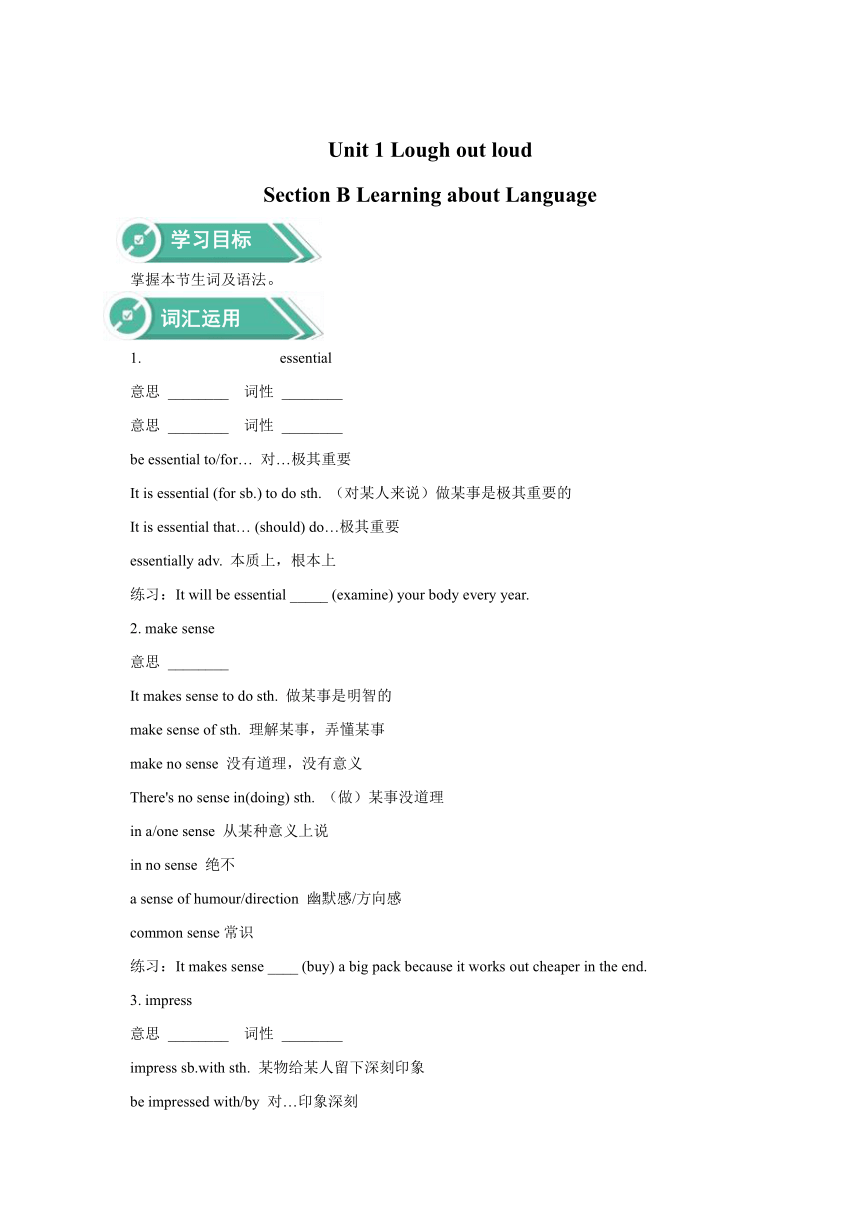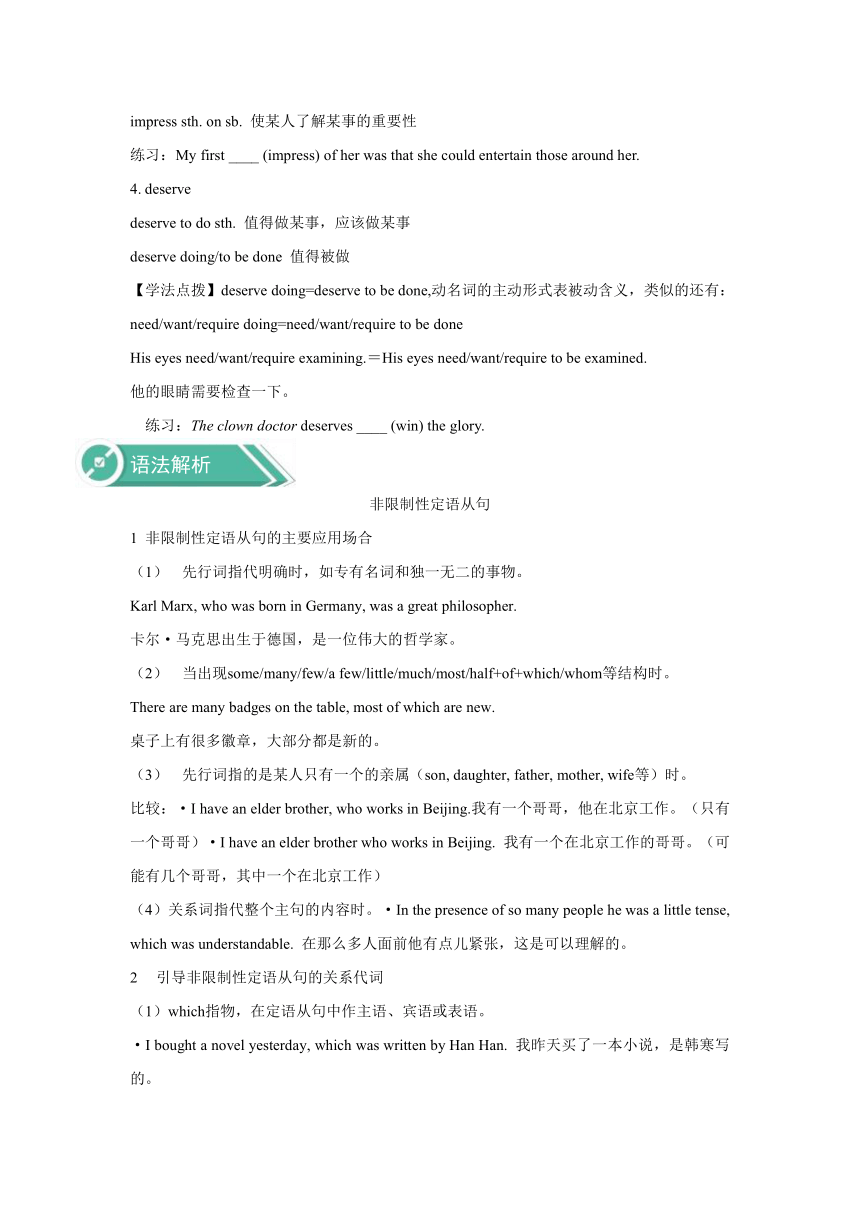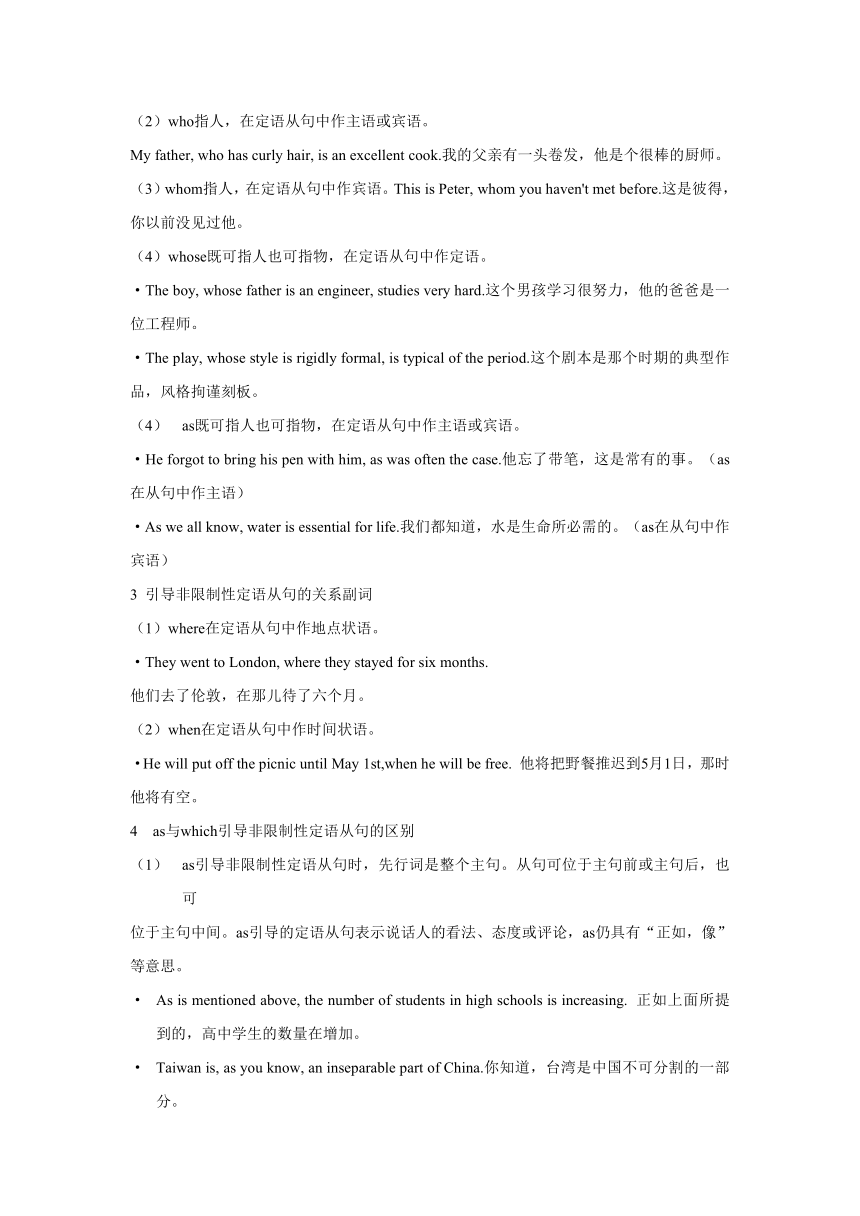外研版2019选择性必修第一册Unit 1 Laugh Out Loud! Section B Using Language(学案)
文档属性
| 名称 | 外研版2019选择性必修第一册Unit 1 Laugh Out Loud! Section B Using Language(学案) |

|
|
| 格式 | zip | ||
| 文件大小 | 59.0KB | ||
| 资源类型 | 教案 | ||
| 版本资源 | 外研版(2019) | ||
| 科目 | 英语 | ||
| 更新时间 | 2022-08-27 08:33:57 | ||
图片预览



文档简介
Unit 1 Lough out loud
Section B Learning about Language
学习目标
掌握本节生词及语法。
词汇运用
essential
意思 ________ 词性 ________
意思 ________ 词性 ________
be essential to/for… 对…极其重要
It is essential (for sb.) to do sth. (对某人来说)做某事是极其重要的
It is essential that… (should) do…极其重要
essentially adv. 本质上,根本上
练习:It will be essential _____ (examine) your body every year.
2. make sense
意思 ________
It makes sense to do sth. 做某事是明智的
make sense of sth. 理解某事,弄懂某事
make no sense 没有道理,没有意义
There's no sense in(doing) sth. (做)某事没道理
in a/one sense 从某种意义上说
in no sense 绝不
a sense of humour/direction 幽默感/方向感
common sense常识
练习:It makes sense ____ (buy) a big pack because it works out cheaper in the end.
3. impress
意思 ________ 词性 ________
impress sb.with sth. 某物给某人留下深刻印象
be impressed with/by 对…印象深刻
impress sth. on sb. 使某人了解某事的重要性
练习:My first ____ (impress) of her was that she could entertain those around her.
4. deserve
deserve to do sth. 值得做某事,应该做某事
deserve doing/to be done 值得被做
【学法点拨】deserve doing=deserve to be done,动名词的主动形式表被动含义,类似的还有:need/want/require doing=need/want/require to be done
His eyes need/want/require examining.=His eyes need/want/require to be examined.
他的眼睛需要检查一下。
练习:The clown doctor deserves ____ (win) the glory.
语法解析
非限制性定语从句
1 非限制性定语从句的主要应用场合
先行词指代明确时,如专有名词和独一无二的事物。
Karl Marx, who was born in Germany, was a great philosopher.
卡尔·马克思出生于德国,是一位伟大的哲学家。
当出现some/many/few/a few/little/much/most/half+of+which/whom等结构时。
There are many badges on the table, most of which are new.
桌子上有很多徽章,大部分都是新的。
先行词指的是某人只有一个的亲属(son, daughter, father, mother, wife等)时。
比较:·I have an elder brother, who works in Beijing.我有一个哥哥,他在北京工作。(只有一个哥哥)·I have an elder brother who works in Beijing. 我有一个在北京工作的哥哥。(可能有几个哥哥,其中一个在北京工作)
(4)关系词指代整个主句的内容时。·In the presence of so many people he was a little tense, which was understandable. 在那么多人面前他有点儿紧张,这是可以理解的。
引导非限制性定语从句的关系代词
(1)which指物,在定语从句中作主语、宾语或表语。
·I bought a novel yesterday, which was written by Han Han. 我昨天买了一本小说,是韩寒写的。
(2)who指人,在定语从句中作主语或宾语。
My father, who has curly hair, is an excellent cook.我的父亲有一头卷发,他是个很棒的厨师。
(3)whom指人,在定语从句中作宾语。This is Peter, whom you haven't met before.这是彼得,你以前没见过他。
(4)whose既可指人也可指物,在定语从句中作定语。
·The boy, whose father is an engineer, studies very hard.这个男孩学习很努力,他的爸爸是一位工程师。
·The play, whose style is rigidly formal, is typical of the period.这个剧本是那个时期的典型作品,风格拘谨刻板。
as既可指人也可指物,在定语从句中作主语或宾语。
·He forgot to bring his pen with him, as was often the case.他忘了带笔,这是常有的事。(as在从句中作主语)
·As we all know, water is essential for life.我们都知道,水是生命所必需的。(as在从句中作宾语)
3 引导非限制性定语从句的关系副词
(1)where在定语从句中作地点状语。
·They went to London, where they stayed for six months.
他们去了伦敦,在那儿待了六个月。
(2)when在定语从句中作时间状语。
·He will put off the picnic until May 1st,when he will be free. 他将把野餐推迟到5月1日,那时他将有空。
4 as与which引导非限制性定语从句的区别
as引导非限制性定语从句时,先行词是整个主句。从句可位于主句前或主句后,也可
位于主句中间。as引导的定语从句表示说话人的看法、态度或评论,as仍具有“正如,像”等意思。
As is mentioned above, the number of students in high schools is increasing. 正如上面所提到的,高中学生的数量在增加。
Taiwan is, as you know, an inseparable part of China.你知道,台湾是中国不可分割的一部分。
He is absorbed in his work, as he often was.他正在全神贯注地工作,他过去经常这样。
which引导非限制性定语从句时,先行词既可以是一个词,也可以是整个主句或主句
的部分内容。which引导的定语从句通常位于主句的后面。which引导的定语从句对主句叙述的内容进行补充说明,常译为“这一点,这件事”等。
·She was very fond of speaking French, which indeed she spoke well.她很喜欢讲法语,而且讲得确实很好。
He tore up my photo, which upset me.他把我的照片撕了,这使我很恼火。
5 限制性定语从句与非限制性定语从句的区别
形式不同:前者紧跟在先行词后,不用逗号隔开;后者用逗号和主句隔开。
·A man who doesn't want to learn much from others can't achieve much. 一个不想向别人多学习的人是不会有多大成就的。
The note was left by Jim, who was here a moment ago.这个便条是吉姆留的,他刚才还在这里。
(2)功能不同:前者起限定作用,不可省略,否则主句意思不完整;后者起补充说明作用,省略后主句意思仍然完整。
·A doctor is a person who cures patients. 医生就是治疗病人的人。
·The big tree was cut down yesterday, which is about three hundred years old. 昨天那棵大树被砍倒了,它大约有三百年的历史了。
(3)关系词不同:前者所有关系词都可引导,在从句中作宾语时可省略;后者that, why不能引导,且均不可省略。He is the clown doctor (whom/who/that) you are looking for.他就是你正在找的那个小丑医生。She had seven children, three of whom lived nearby.她有七个孩子,其中三个就住在附近。
(4)先行词不同:前者的先行词往往是某一个词;后者的先行词可以是一个词,也可以是主句的一部分,甚至是整个主句。The hotel which we stayed at was not clean.我们住的那家旅馆不干净。The boy with curly hair lost her badge, which annoyed her much.那个卷发男孩把她的徽章弄丢了,这使她很恼火。
(5)翻译方式不同:前者一般译为定语,而后者一般译为并列分句。The watch that he gave me for my birthday is very nice.我过生日时他送给我的手表很漂亮。Mr. Zhang, who came to see me yesterday, is an old friend of mine.张先生昨天来看我,他是我的一位老朋友。
练习:
① The employer, ____ all the employees respect, is concerned about his employees' working conditions.
② She was patient with the children, ____ her husband seldom was.
③ The poet, ____ poems are best loved, once lived in this region.
④ The little boy can speak two foreign languages, ____ surprises all the people present.
⑤ I met Professor Xu, ____ told me the result of the election.
⑥ We won the game, ____ we expected.
⑦ Kate, ____ sister I shared a room with when we were at college, has gone to work in Australia.⑧ To write some dull poems, ____ many so-called poets do, is unworthy of him.
答案:
词汇运用:1.to examine 2.to buy 3.impression 4.to win
语法解析:①whom/who ②which ③whose ④which ⑤who ⑥as ⑦whose ⑧as
Section B Learning about Language
学习目标
掌握本节生词及语法。
词汇运用
essential
意思 ________ 词性 ________
意思 ________ 词性 ________
be essential to/for… 对…极其重要
It is essential (for sb.) to do sth. (对某人来说)做某事是极其重要的
It is essential that… (should) do…极其重要
essentially adv. 本质上,根本上
练习:It will be essential _____ (examine) your body every year.
2. make sense
意思 ________
It makes sense to do sth. 做某事是明智的
make sense of sth. 理解某事,弄懂某事
make no sense 没有道理,没有意义
There's no sense in(doing) sth. (做)某事没道理
in a/one sense 从某种意义上说
in no sense 绝不
a sense of humour/direction 幽默感/方向感
common sense常识
练习:It makes sense ____ (buy) a big pack because it works out cheaper in the end.
3. impress
意思 ________ 词性 ________
impress sb.with sth. 某物给某人留下深刻印象
be impressed with/by 对…印象深刻
impress sth. on sb. 使某人了解某事的重要性
练习:My first ____ (impress) of her was that she could entertain those around her.
4. deserve
deserve to do sth. 值得做某事,应该做某事
deserve doing/to be done 值得被做
【学法点拨】deserve doing=deserve to be done,动名词的主动形式表被动含义,类似的还有:need/want/require doing=need/want/require to be done
His eyes need/want/require examining.=His eyes need/want/require to be examined.
他的眼睛需要检查一下。
练习:The clown doctor deserves ____ (win) the glory.
语法解析
非限制性定语从句
1 非限制性定语从句的主要应用场合
先行词指代明确时,如专有名词和独一无二的事物。
Karl Marx, who was born in Germany, was a great philosopher.
卡尔·马克思出生于德国,是一位伟大的哲学家。
当出现some/many/few/a few/little/much/most/half+of+which/whom等结构时。
There are many badges on the table, most of which are new.
桌子上有很多徽章,大部分都是新的。
先行词指的是某人只有一个的亲属(son, daughter, father, mother, wife等)时。
比较:·I have an elder brother, who works in Beijing.我有一个哥哥,他在北京工作。(只有一个哥哥)·I have an elder brother who works in Beijing. 我有一个在北京工作的哥哥。(可能有几个哥哥,其中一个在北京工作)
(4)关系词指代整个主句的内容时。·In the presence of so many people he was a little tense, which was understandable. 在那么多人面前他有点儿紧张,这是可以理解的。
引导非限制性定语从句的关系代词
(1)which指物,在定语从句中作主语、宾语或表语。
·I bought a novel yesterday, which was written by Han Han. 我昨天买了一本小说,是韩寒写的。
(2)who指人,在定语从句中作主语或宾语。
My father, who has curly hair, is an excellent cook.我的父亲有一头卷发,他是个很棒的厨师。
(3)whom指人,在定语从句中作宾语。This is Peter, whom you haven't met before.这是彼得,你以前没见过他。
(4)whose既可指人也可指物,在定语从句中作定语。
·The boy, whose father is an engineer, studies very hard.这个男孩学习很努力,他的爸爸是一位工程师。
·The play, whose style is rigidly formal, is typical of the period.这个剧本是那个时期的典型作品,风格拘谨刻板。
as既可指人也可指物,在定语从句中作主语或宾语。
·He forgot to bring his pen with him, as was often the case.他忘了带笔,这是常有的事。(as在从句中作主语)
·As we all know, water is essential for life.我们都知道,水是生命所必需的。(as在从句中作宾语)
3 引导非限制性定语从句的关系副词
(1)where在定语从句中作地点状语。
·They went to London, where they stayed for six months.
他们去了伦敦,在那儿待了六个月。
(2)when在定语从句中作时间状语。
·He will put off the picnic until May 1st,when he will be free. 他将把野餐推迟到5月1日,那时他将有空。
4 as与which引导非限制性定语从句的区别
as引导非限制性定语从句时,先行词是整个主句。从句可位于主句前或主句后,也可
位于主句中间。as引导的定语从句表示说话人的看法、态度或评论,as仍具有“正如,像”等意思。
As is mentioned above, the number of students in high schools is increasing. 正如上面所提到的,高中学生的数量在增加。
Taiwan is, as you know, an inseparable part of China.你知道,台湾是中国不可分割的一部分。
He is absorbed in his work, as he often was.他正在全神贯注地工作,他过去经常这样。
which引导非限制性定语从句时,先行词既可以是一个词,也可以是整个主句或主句
的部分内容。which引导的定语从句通常位于主句的后面。which引导的定语从句对主句叙述的内容进行补充说明,常译为“这一点,这件事”等。
·She was very fond of speaking French, which indeed she spoke well.她很喜欢讲法语,而且讲得确实很好。
He tore up my photo, which upset me.他把我的照片撕了,这使我很恼火。
5 限制性定语从句与非限制性定语从句的区别
形式不同:前者紧跟在先行词后,不用逗号隔开;后者用逗号和主句隔开。
·A man who doesn't want to learn much from others can't achieve much. 一个不想向别人多学习的人是不会有多大成就的。
The note was left by Jim, who was here a moment ago.这个便条是吉姆留的,他刚才还在这里。
(2)功能不同:前者起限定作用,不可省略,否则主句意思不完整;后者起补充说明作用,省略后主句意思仍然完整。
·A doctor is a person who cures patients. 医生就是治疗病人的人。
·The big tree was cut down yesterday, which is about three hundred years old. 昨天那棵大树被砍倒了,它大约有三百年的历史了。
(3)关系词不同:前者所有关系词都可引导,在从句中作宾语时可省略;后者that, why不能引导,且均不可省略。He is the clown doctor (whom/who/that) you are looking for.他就是你正在找的那个小丑医生。She had seven children, three of whom lived nearby.她有七个孩子,其中三个就住在附近。
(4)先行词不同:前者的先行词往往是某一个词;后者的先行词可以是一个词,也可以是主句的一部分,甚至是整个主句。The hotel which we stayed at was not clean.我们住的那家旅馆不干净。The boy with curly hair lost her badge, which annoyed her much.那个卷发男孩把她的徽章弄丢了,这使她很恼火。
(5)翻译方式不同:前者一般译为定语,而后者一般译为并列分句。The watch that he gave me for my birthday is very nice.我过生日时他送给我的手表很漂亮。Mr. Zhang, who came to see me yesterday, is an old friend of mine.张先生昨天来看我,他是我的一位老朋友。
练习:
① The employer, ____ all the employees respect, is concerned about his employees' working conditions.
② She was patient with the children, ____ her husband seldom was.
③ The poet, ____ poems are best loved, once lived in this region.
④ The little boy can speak two foreign languages, ____ surprises all the people present.
⑤ I met Professor Xu, ____ told me the result of the election.
⑥ We won the game, ____ we expected.
⑦ Kate, ____ sister I shared a room with when we were at college, has gone to work in Australia.⑧ To write some dull poems, ____ many so-called poets do, is unworthy of him.
答案:
词汇运用:1.to examine 2.to buy 3.impression 4.to win
语法解析:①whom/who ②which ③whose ④which ⑤who ⑥as ⑦whose ⑧as
